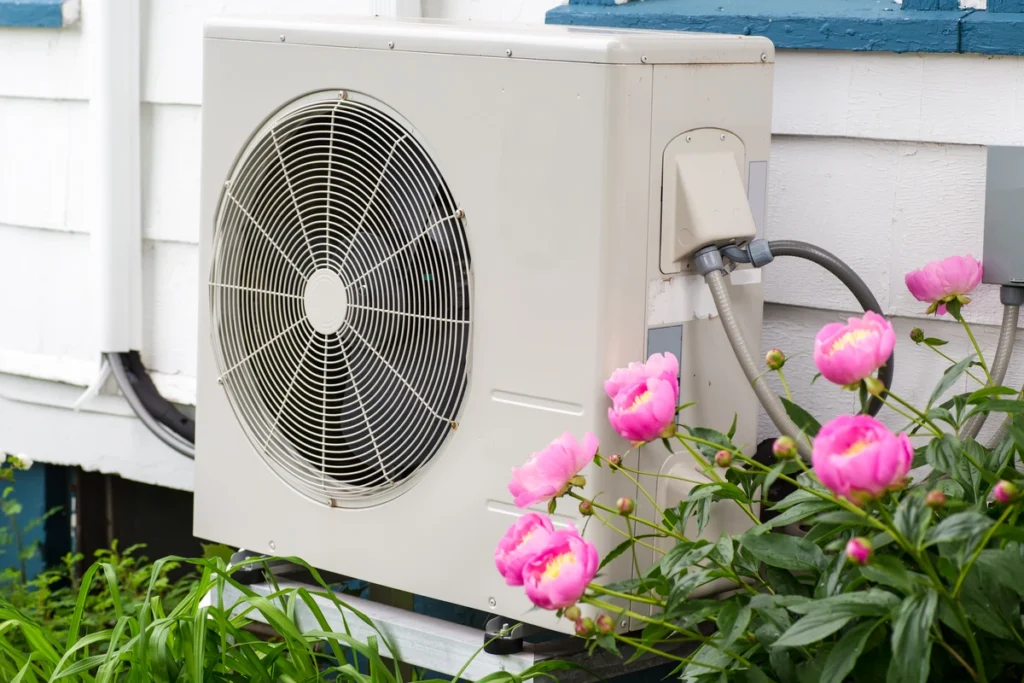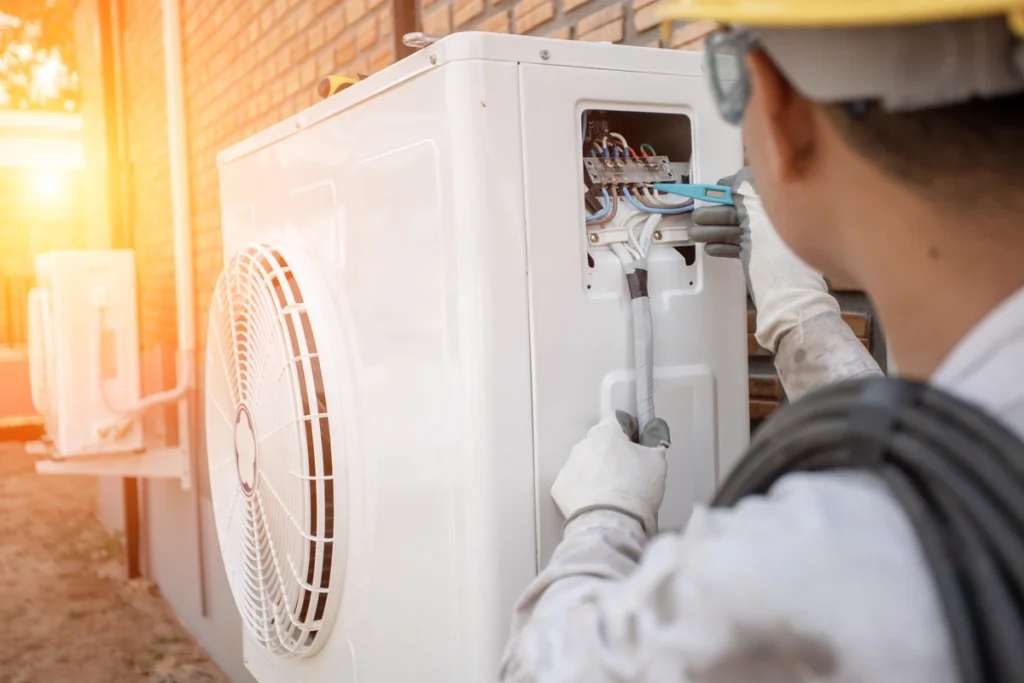In the realm of home heating and cooling systems, heat pumps stand out as versatile and efficient solutions. They offer both heating and cooling capabilities, making them popular choices for many homeowners. However, like any mechanical system, heat pumps have a finite lifespan. Understanding how long a heat pump lasts and what factors can affect its longevity is crucial for homeowners looking to maximize their investment.
In this comprehensive guide, we’ll delve into the world of heat pumps, exploring:
- What they are
- How long they typically last
- Signs of damage
- Maintenance tips
- When it might be time for repair or replacement
How long do heat pumps last? Keep reading to learn more!
What is a Heat Pump?

Before diving into the lifespan of heat pumps, let’s establish what they are and how they work. Essentially, a heat pump is a device that transfers heat from one location to another. In the context of home heating and cooling, heat pumps extract heat from the air or ground outside the home during the heating season and transfer it inside. During the cooling season, they reverse this process, extracting heat from inside the home and transferring it outside. This dual functionality makes heat pumps highly efficient, as they can both heat and cool a space using the same system.
Signs of Heat Pump Damage
While heat pumps are known for their reliability, they are not immune to wear and tear. Like any mechanical system, they can experience issues over time. Recognizing the signs of heat pump damage early on can help prevent more significant problems down the line. Some common indicators of heat pump issues include:
- Reduced Heating/Cooling Efficiency: If you notice that your heat pump is struggling to maintain comfortable temperatures or is taking longer to heat or cool your home, it could be a sign of underlying issues.
- Strange Noises: Unusual sounds such as grinding, banging, or squealing coming from your heat pump may indicate mechanical problems that need attention.
- Frost or Ice Build-Up: During the heating season, excessive frost or ice accumulation on the outdoor unit of your heat pump could signal issues with the defrost cycle or refrigerant levels.
- Increased Energy Bills: A sudden spike in your energy bills without a corresponding increase in usage could indicate that your heat pump is not operating efficiently.
- Short Cycling: If your heat pump frequently turns on and off in short intervals, it may be cycling improperly, which can lead to increased wear and tear on the system.
How Long Do Heat Pumps Usually Last?
The lifespan of a heat pump can vary depending on several factors, including the quality of the unit, how well it’s maintained, and environmental conditions. On average, a well-maintained heat pump can last anywhere from 10 to 15 years. However, some high-quality models can endure for 20 years or more with proper care. Regular maintenance, such as cleaning or replacing filters, inspecting and lubricating moving parts, and checking refrigerant levels, can help prolong the lifespan of your heat pump.
When to Call Someone to Repair Your Heat Pump

If you notice any of the aforementioned signs of heat pump damage or if your system is not performing as expected, it’s essential to address the issue promptly. While some minor maintenance tasks can be performed by homeowners, more complex repairs should be handled by qualified HVAC professionals. Here are some instances when it’s time to call someone to repair your heat pump:
Persistent Performance Issues:
If your heat pump consistently fails to heat or cool your home effectively despite regular maintenance, it may require professional attention.
Refrigerant Leaks:
Refrigerant leaks can not only compromise the performance of your heat pump but also pose environmental and health risks. A qualified technician can identify and repair any leaks safely.
Electrical Problems:
Issues with the electrical components of your heat pump, such as faulty wiring or capacitor failure, should be addressed by a professional to prevent further damage or safety hazards.
Unusual Odors:
Strange odors emanating from your heat pump, such as burning or musty smells, could indicate wiring issues, mold growth, or other problems that require professional diagnosis and repair.
When Should You Replace Your Heat Pump?
While regular maintenance and repairs can extend the lifespan of your heat pump, there comes a time when replacement is the most cost-effective option. Here are some signs that it may be time to replace your heat pump:
- Age: If your heat pump is approaching or exceeding its expected lifespan and requires frequent repairs, it may be more economical to invest in a new, more energy-efficient model.
- Rising Energy Bills: As heat pumps age, they can become less efficient, leading to increased energy consumption and higher utility bills. Upgrading to a newer, more energy-efficient model can help save money in the long run.
- Significant Damage: If your heat pump has sustained severe damage due to factors such as corrosion, compressor failure, or refrigerant leaks, replacement may be the best course of action.
- Outdated Technology: Advances in HVAC technology have led to more efficient and environmentally friendly heat pump models. If your current system lacks modern features such as variable-speed compressors or smart thermostats, upgrading to a newer model can improve comfort and energy efficiency.
The Cost to Replace a Heat Pump
The cost of replacing a heat pump can vary depending on several factors, including the size of your home, the type of heat pump system you choose, and any additional components or accessories required for installation. On average, the cost to replace a heat pump ranges from $4,000 to $8,000, including both equipment and installation costs. However, this cost can be higher for larger homes or if extensive ductwork modifications are needed. It’s essential to obtain multiple quotes from reputable HVAC contractors to ensure you’re getting the best value for your investment.
How to Maintain Your Heat Pump: 5 Tips
Regular maintenance is key to ensuring the longevity and performance of your heat pump. Here are some essential maintenance tasks to keep your system running smoothly:
1) Clean or Replace Air Filters:
Dirty or clogged air filters can restrict airflow and reduce the efficiency of your heat pump. Check your filters regularly and clean or replace them as needed, typically every 1 to 3 months.
2) Inspect Outdoor Unit:
Keep the outdoor unit of your heat pump free from debris such as leaves, grass clippings, and snow. Trim any vegetation around the unit to ensure adequate airflow.
3) Check Refrigerant Levels:
Low refrigerant levels can indicate a leak or other issues with your heat pump. Have a qualified technician inspect and recharge the refrigerant as needed.
4) Lubricate Moving Parts:
Lubricate the moving parts of your heat pump, such as fan motors and bearings, to reduce friction and prolong their lifespan.
5) Schedule Professional Maintenance:
In addition to regular DIY maintenance tasks, schedule annual maintenance inspections with a qualified HVAC technician. They can identify and address any issues before they escalate into costly repairs.
Repairs for Your Heat Pump System
Heat pumps are reliable and efficient heating and cooling solutions for many homeowners. By understanding the typical lifespan of heat pumps, recognizing signs of damage, and following proper maintenance guidelines, you can maximize the performance and longevity of your system. Knowing when to repair or replace your heat pump and understanding the associated costs can help you make informed decisions to ensure your home remains comfortable year-round.
Whether you’re enjoying the warmth of your heat pump on a cold winter day or basking in the cool comfort it provides during the summer months, proper care and maintenance will keep your system running smoothly for years to come. Contact Palmetto today to get started!
